 By Pepper Parr By Pepper Parr
BURLINGTON, ON March 24, 2012 It would be nice to know that there has been a meeting that involved senior people at city hall and senior people at the hospital and ideally our provincial MPP, where they attempted to set out what the options for the city and its hospital are when the provincial budget is released on Tuesday.
The likelihood of Jane McKenna being at the table are slim – she has been left out of the loop having to do with the hospital. Senior staff at Joseph Brant Memorial Hospital rely on Ancaster – Dundas – Flamborough – Westdale MPP Ted McMeekin to speak for them and plead their case.
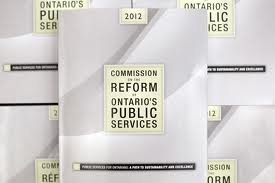 The provincial government commissioned a document that came to be known as the Drummond Report. The purpose of the report was to tell the government where savings could be found and point to some possible directions for the government. One decision was to sell the LCBO warehouse on the waterfront in Toronto but it went much deeper than small cosmetic changes. The report made it very clear: there had to be very deep and significant cuts in spending which were set out in the 346 recommendations made in the 945 page two volume report. The provincial government commissioned a document that came to be known as the Drummond Report. The purpose of the report was to tell the government where savings could be found and point to some possible directions for the government. One decision was to sell the LCBO warehouse on the waterfront in Toronto but it went much deeper than small cosmetic changes. The report made it very clear: there had to be very deep and significant cuts in spending which were set out in the 346 recommendations made in the 945 page two volume report.
Premier Dalton McGuinty made it clear that he was not going to cut classroom sizes nor was he prepared to ease up on all day kindergarten plans. He was prepared to ask teachers to get by without a pay raise for two years but that was as far as he was prepared to go with education cuts..
It was clear that infrastructure spending was going to be cut and that hospital construction was going to feel the impact. Pre budget comments from anyone is more than a “mugs” game; budget leaks are a no, no and anyone who says they have spoken to someone “who knows” is spinning fog and deliberately misleading.
There have been reports that Mario Joanette, vice president communications knows for sure that the Joseph Brant Memorial Hospital re-development is not going to be included in the cuts. Joanette just doesn’t know that for certain. The only way he could know is if Treasurer Jim Flaherty whispered the words in his ear, and if that whispering took place on St. Patrick’s Day then it doesn’t count. Joanette, like everyone else, will know what is going to happen by the end of the day on Tuesday, when the budget is read out in the provincial Legislature.
If the re-development of the hospital is the best thing for Burlington, then the project should proceed, if the government can afford it. It is not my belief that re-developing Joseph Brant is the best thing for the community nor do I believe the government has the money to do the job. My view is that at best, the JBMH project will get pushed back to 2017.
What responsible politicians and bureaucrats should be doing is gathering in a room and trying to set out just what the options are if the government moves a starting date back or, what the city does if they take this re-development right off the table.
The city is certainly doing its share to pay for the community portion of $120 million: $60 million from the Hospital Foundation and $60 million by the city. Burlington has already set aside more than $4 million in a reserve fund that will get sent along to the hospital once there is an agreement in place as to just what the money is to actually be spent on. At this point the Memorandum of Understanding is still unsigned.
What has become clearer recently for the public is that the “parking garage” is quite a bit more than a place to store cars. It is going to be the location for the Family Medicine Practice that McMaster University has said they want to locate on the JBMH property. McMaster has basically diddled the city on just about every project they have done with the city.
McMaster announced recently that their “preferred” location for the Family Medicine Practice was on the hospital property. The agreement between McMaster University, the Region and Burlington had an Amendment that defined just what was meant by Health Care and where it was to be located – ”within the boundary of the mixed uses centre” of the city of Burlington. The Health Care part is now known as the Family Medical Practice which we now know is going to be part of the parking garage that was talked about at all the city council meetings. Along with the parking garage, the structure will include two floors of medical services space that is to be a minimum of 10,000 square feet and the offices of the Hospital Foundation. The structure is reported to be seven storeys high.
Quite how one describes the JBMH complex as part of the downtown with a straight face is beyond me. Ian Ross, Executive Director of the Burlington Art Centre, will tell you that he doesn’t see his buildings as part of the downtown core and the hospital is west of the Art Centre. Those academics sure know how to twist language.
The first thing that has to happen is the creation of a common agenda. Differences aside – we are all in this together – and we all rely on the provincial government to provide funding and right now our provincial government is close to broke. The impact of the 2008 recession still lingers, to which has to be has added, the significant structural shift taking place in the Canadian economy. Ontario, once the engine of the country’s economy, is now struggling as it transforms itself out of the manufacturing sector into – well the province isn’t quite sure what it is going to transform into. What it does believe it knows is that we are going to have to have a well-educated work force and thus the decision to pump money we do have into education.
That doesn’t relieve the leaders of Burlington from their responsibilities – and that is to figure out how we will deal with a decision that says “no provincial money” for Burlington for maybe as much as five years.
For something like this to work however, everyone has to come to the table and agree on a common agenda. Right now we have McMaster still taking advantage of everyone. Burlington is still paying McMaster the $10 million it agreed to pay if they located some of the facilities in the city. The DeGroote School of Business did come to Burlington and there was at one point a sign on the Elizabeth Street parking lot announcing it was to be built at that location but, someone else with land to sell got in between the city and the University and the DeGroote School of Business is now out on the South Service Road..
Does Burlington hand over the $4.8 million it has in the bank and continue to pass along the $60 million they have committed tax payers to over the next six years?
The hospital foundation hasn’t exactly been issuing press release after press release telling us that they now have $20 million; now thirty million and getting close to forty five million in the bank. Hospital CEO Eric Vanderwall boldly told Burlington city council that the hospital would match the city dollar for dollar in fund raising – don’t think they can do that today. The people with the fat wallets seem to be sitting on them. The one thing the public has seen is a two page full colour spread in a local newspaper with pictures of the fund raising committee. We hope that space was a gift from the newspaper.
What does the city do if the government says: “Yes, but not right now – and we will tell you when.” Well what can we do? Tell the ambulance to head for Hamilton is one option. The new Oakville hospital is under construction and the flow of funds to that site will not stop so that’s an option – as long as your need for serious surgery can wait that long.
Burlington Council member John Taylor thinks there is a better way to pay for the hospital and has asked that the city look into funding the $70 million city portion with some form of a bond that would be available to the public.
Right now when Burlington has to go to the public financial markets for funds, which we do every year, we tally up what we need and take that number to the Region. Their treasurer adds up what each of the municipalities in the Region needs and then goes to the public markets and gets the best deal possible deal for the debenture they put on the market. Municipal debt is seen as good risk. The Region, as Chair Gary Carr will remind you, has a better credit rating than the United States of America.
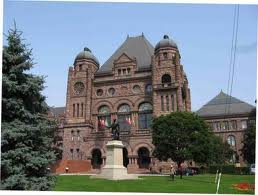 The provincial government will announce on Tuesday where they will cut spending. It is expected to be drastic and may well impact on JBMH re-development plans. No one really knows what is going to happen. Any commment made is misleading and irresponsible. Taylor’s view is that some of the debt the Region sells could be set up in such a way that it qualifies for inclusion in an RRSP for even an RESP. While it takes a little more effort, the Region might have enough clout in the financial markets and be able to cut out some of the middle men in the game and keep the administration costs on these things lower than usual. Are there enough people in Burlington, or the Region for that matter, to take up several hundred million so that Burlington could raise the money on its own and proceed with building the hospital with money ‘invested’ by the community. Taylor has enough people who think the idea has some merit and will be meeting with Regional people to see what’s possible.
The province doesn’t have the money but they do have a credit rating and we could – maybe – sell some of the bonds to the province and have them pay Burlington citizens back in 15 to 20 years when the bonds mature. Regional debentures will certainly pay more than the miserable return the banks are giving these days and they are as solid as Canada Savings Bonds.
There are all kinds of possibilities but we have to get off our butts and do some of this thinking for ourselves because no one else is going to do it for us.

 By Pepper Parr By Pepper Parr
BURLINGTON, ON February 17, 2012 The Burlington Fire Department has an idea for your family on Family Day. Not quite the same as goofing around and doing nothing.
The fire department is asking families to make a home fire escape plan and practice it as part of their Family Day activities on Monday, Feb. 20.
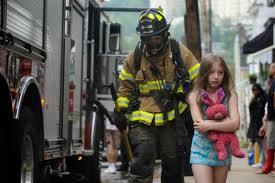 This little girl got out of the house - the tragedies are when people don't make it out during a fire. Plan an escape on Family Day “Everyone is responsible to ensure they know what to do if a fire occurs in their home,” said Public Education Officer Lisa Cockerill. “If there is a fire in your home, it’s important to be alerted by working smoke alarms so you can quickly execute your family’s escape plan.”
Simple steps for home fire escape planning include:
Install smoke alarms on every storey and outside sleeping areas. It’s the law. For the best protection, install smoke alarms in every bedroom.
Develop a home fire escape plan; discuss it with the entire family and practise the escape plan.
Check that all exits are unobstructed and easy to use.
Determine who will be responsible for helping young children, older adults or anyone else that may need assistance.
Choose a meeting place outside, such as a tree or a lamp post, where everyone can be accounted for.
If caught in a smoke-filled area, get low and go under the smoke to the nearest safe exit.
 You can too escape safely from fires that rage like this. Call the fire department from outside the home, from a cell phone or neighbour’s home.
Once out, stay out. Never re-enter a burning building.
Doesn’t sound very cool does it, common sense seldom is “cool” to the younger people. But we’re not talking to the younger set; we are talking to parents and as you take the GO or drive to work on Tuesday you might think about the important thing you did for your children – and it could be made into a fun event.
You may have only seconds to safely escape your home. Practice your home fire escape plan and know where to meet outside the home to save your life and the lives of loved ones.

 By Pepper Parr By Pepper Parr
Burlington, Ont. –Jan. 26, 2012—McMaster University has selected Joseph Brant Memorial Hospital as the preferred site for the Halton McMaster Family Health Centre, the city, Halton Region, McMaster University and Joseph Brant Memorial Hospital (JBMH) announced jointly today. Nice news, but notice the city of Burlington isn’t in that list of names.
Now, pay very close attention to the language used – the JBMH is their preferred site, which is a long mile away from being THE site. The decision isn’t theirs to make – theirs being McMaster, the Region or the JBMH.
“This is an important announcement for Burlington, and demonstrates a partnership that is devoted to enhancing health care in our city,” Mayor Rick Goldring said today at the Burlington Convention Centre during his State of the City address. “Creating a teaching hospital here in Burlington will raise the quality of health care for the people of Burlington and provide a great complement to the redevelopment of Joseph Brant hospital.”
It might – but isn’t there going to be a teaching element at the new hospital being built in Oakville? Does anyone really think that the province, who happen to be a little short of cash these days, is going to build a teaching hospital in Burlington? Great if we can get it – but I don’t think it’s in the cards girls and boys.
The city and the region have committed $10 million to McMaster University as part of the Ron Joyce Centre, housing the DeGroote School of Business, on South Service Road. This project included a commitment by McMaster to open a Halton McMaster Family Health Centre in downtown Burlington.
Well, McMaster has reneged on Burlington in the past (recall the plans – heck even an announcement and a sign saying parking lot # 4 on John Street was going to be the home of the McMaster/DeGroote School of Business – but somehow the buildings migrated a bit to the south and east of our downtown core.
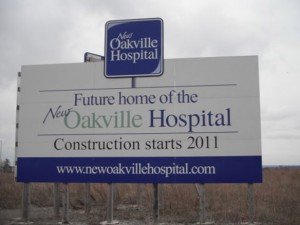 The Oakville hospital is under construction. Their Foundation has raised more than $18 million. Staff have donated $675,000. JBMH doesn't even have a sign announcing their re-development. There is a drawing. “One of the key initiatives in the Citizens’ Priorities – Halton Region’s 2011-2014 Action Plan is to attract new physicians to establish medical practices in Halton,” said Regional Chair Gary Carr. “A partnership such as this will help to bring new physicians to the Region, and give more residents access to a family doctor.”
 The new Oakville hospital is under construction. Hamilton has two hospitals. Is the provincial government going to pay for a large new hospital when there are hospitals less than a 15 minute drive away? Tough to do when the province admits they don't have any money. There are more than 30 other communities looking for money to build hospitals. Milton is in desperate shape. Doctors are going to come to Halton Mr. Carr but they will be settling in at the NEW Oakville Hospital where there is already a hole in the ground with a fixed price contract signed and more than $18 million raised buy their hospital foundation – of which more than $675, 000.00 came from the staff.
McMaster anticipates using two floors, and about 15,000 square feet (1,394 square metres), of Joseph Brant as part of the Phase 1 project. All parties hope to be operational at Joseph Brant by the end of 2013.
These guys have taken the Liberal Party resolution to allow the public sale of marijuana too seriously and are clearly setting aside some of their allowance money to buy good weed and a little less on single malt. McMaster wants those two floors of space and if they have to jerk the public around to get it – well tough on the public. We’re talking turf here people, not to mention budgets.
“Although we are still working through our approval process, we know this location for the family health centre will be an excellent opportunity to strengthen our ties to Joseph Brant Memorial Hospital for the benefit of the hospital, the residents of Burlington and Halton and the Michael G. DeGroote School of Medicine,” said Dr. David Price, chair of the Department of Family Medicine at McMaster University. “This centre will also serve our expanding family medicine program in the Region.”
Pipe dreams, pipe dreams and terribly mis-leading. 2013? – they won’t even have a hole in the ground by then.
Dr. John Kelton, dean and vice-president of the Faculty of Health Sciences, added: “This is an important step of our move towards having learners from our medical school and many of our health science programs involved in health care throughout Halton.”
The site plan application for Phase 1 will be submitted to the city’s planning and building department in May. Public consultation will help the community better understand the plans at Joseph Brant.
Are these people assuming that the Memorandum of Understanding between the city of Burlington and the JBMH will be signed by May? It’s been, what, five months in the making so far. There are people on Burlington city council who don’t want as much as a dime moving out of the reserve fund that has something in excess of $4.8 million in it at the moment. If one counts the votes on the Burlington city council – I don’t think there are enough to slip this one past the public.
If this Burlington city council gives the JBMH any of the money raised through a special tax levy and all the city has to show for it is a parking garage – every member of council is at risk of not being elected. Burlington has put up with The Pier debacle and are going along with their Mayor and his decision to complete The Pier. They will not go along with paying $60 million for a parking lot.
On Aug. 10, 2011, the province confirmed that the Joseph Brant Memorial Hospital re-development project is approved. This project, with a budget of more $300 million, will result in a significantly rejuvenated hospital.
You do recall dear readers that we were in the middle of a provincial election and the Liberals were going to say whatever they had to say to stay in office. One of the things they said was that Burlington was going to get its hospital. Recall too, that the Minister who was on her way to Burlington to deliver that good news didn’t make it. She didn’t make it at the polls either – she lost her seat.
“We are very pleased to have the new Halton McMaster Family Health Centre on our hospital site,” said Dr. Dwight Prodger, Chief of Staff at Joseph Brant Memorial Hospital. “There will be many benefits to Burlington and area residents with the HMFHC being located here including improved access to family medicine and specialist physicians and it will also help increase the hospital’s ability to recruit and retain new physicians.”
They will be pleased as punch to get a teaching hospital settled in at the JBMH.. Using lines like “very pleased to have” suggests this is a done deal. Go back to that headline – a teaching facility is their “preferred” location.
The project will proceed in two Phases. The hospital will begin with an RFP process and tender on Phase 1 in 2012 and construction in 2013. Phase 2 will go through a similar process with the tender award in 2014.
This sounds a little like the early stages of The Pier – recall that there was a plan that called for a much larger pier but when the prices came in – well things got cut back a bit. Expect lots of cutting back on this one as well. It just might get cut right back to the tap root.
In December 2009, City Council approved a municipal contribution of $60 million for the proposed hospital redevelopment plan. The city is working on a Memorandum of Understanding and contribution agreement with the hospital that will outline when and how Joseph Brant Memorial Hospital will receive the city funding.
This is true. The when and how of those funds moving from the city’s bank account to the hospitals is far from settled.
The city began collecting $1.2 million in 2010 and 2011 through a special tax levy. City Council earmarked $2.4 million from previous years’ surpluses, and now has $4.8 million committed in a reserve fund earning interest. The tax levy amounts to $4 for each $100,000 of residential assessment.
This is also true but it doesn’t mean that we are going to see a teaching facility at the JBMH.
The city has shown leadership in committing $60 million for the hospital redevelopment, and taxpayers have confirmed they think this money should be spent on improving our community hospital.
This too is also true – more true is that city put their money where their mouths are. The JBMH Foundation has yet to announce that they have raised as much as a dime. They did have a nice group photo taken.
The Joseph Brant Memorial Hospital redevelopment and expansion is a $300 million-plus project. The planned civic contribution is $120 million. The Joseph Brant Hospital Foundation has committed to raising $60 million through a fundraising campaign in addition to the city’s contribution of $60 million.
Nice statement but no announcement from the Hospital Foundation as to how much they have raised. There are a number of traditional major donors who are keeping their cheque books in their pockets. When the redevelopment of the hospital is real – they will write cheques.
A telephone survey by Ipsos Reid in November 2009 found strong public support for the hospital redevelopment project and for a municipal contribution. Ninety per cent of Burlington residents surveyed agreed the project was important, and 72 per cent of those surveyed were supportive of the project when told about the proposed $60 million municipal contribution.
So? Can you imagine anyone saying they don’t want an improved hospital.. Burlington people are quite decent and they would see the need for the city to pay a portion.
Joseph Brant Memorial Hospital was built in 1961. The last major update and refurbishment was more than 40 years ago. The redevelopment of the hospital is expected to include: 10 new operating rooms, a new intensive care unit, 76 new in-patient beds, an enlarged and improved cancer unit, new diagnostic imaging and laboratory areas, enlarged parking facilities; and an expanded outpatient surgical suite.
Those enlarged parking facilities are where the Burlington tax dollars are going to go. Someone needs to put a hobble on all this.

 By Staff By Staff
BURLINGTON, ON January 10, 2012 – The Mayors Inspire program that featured Andre Picard will be re-broadcast on Cogeco Cable at 9:30 pm on January 12, 2012 – well worth watching.. You will get to hear one of the best thinkers on public health policy in the country, who will explain just what it is we have in the way of a public health system in Ontario and where it is likely to go.
The Picard talk, given at a time when the direction for health services in Burlington is less than certain, helps to understand the financial challenges the province faces and sets aside many of the myths that surround public health services.
This presentation was the last of four Mayor Rick Goldring sponsored during 2011. They have proven to be quite a success – the last filled the Community Studio Theatre at the Performing Arts Centre. Goldring expects to sponsor another series in 2012.

 By Pepper Parr By Pepper Parr
BURLINGTON, ON January 4th, 2012 – There, that didn’t hurt now did it? Remember those words from your first visit to the doctor? It was a new experience for you and one you would get used to for the rest of your life. A similar experience came across the desk of Joseph Brant Memorial Hospital CEO and President Eric Vandewall this week. Ontario’s Freedom of Information legislation was made to apply to the medical community and JBMH had to post the information on its web site. Now anyone and everyone can log in and see what the man is paid. There is nothing exorbitant in Vandewall’s contract. Some of his colleagues elsewhere in the province, particularly across the Bay, do much better.
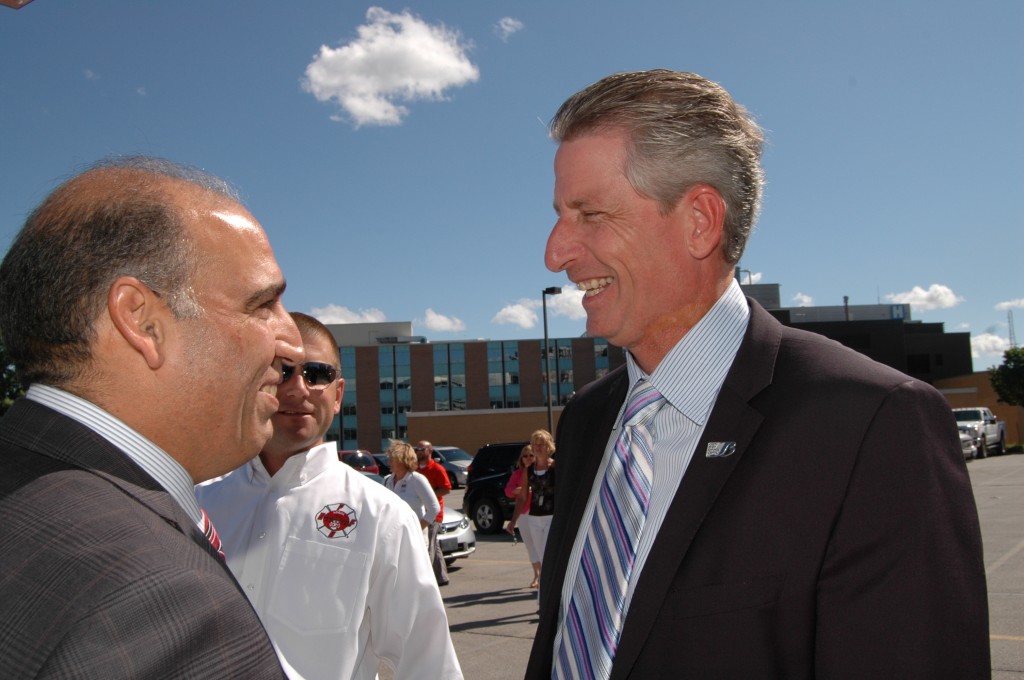 Liberal candidate in the provincial election Karmel Sakran shares a smile with JBMH CEO Eric Vandewall at an event where everyone hoped a provincial government minister was expected to show up with a funding announcement. Sakran at the time was a member of the hospital Board and was in line to become chairman of the hospital board but resigned when he ran for office - and lost. Sakran's signature appears on Vandewall's employment contract as a witness. To spare you the trouble of going through the 10 page agreement we can tell you that the hospital hired Vandewall in June of 2010 at a salary of $325,000 plus a car allowance of $1000. a month. He has to pay for parking like everyone else, which is more than can be said of Burlington city council members, but then they don’t get the big bucks that Eric gets.
In December of this year Vandewall’s salary was increased to $338,428. But there was a hook added to the compensation agreement. $17,767. of that salary is “at risk”, meaning that it is possible for Vandewall to not to actually get the full $338,428. in his contract. Has to earn this portion of his salary by meeting designated objectives outlined in the Hospitals’ Quality Improvement Plan. Personally, I hope for Vandewall that one of the objectives isn’t his getting real money from the province to rebuild his hospital. I think the province is going to stiff him because it just isn’t going to have the money.
That level of detail in the contract “designated objectives” portion of the contract is something best left to the hospital Board. You have to trust them to hold Vandewall accountable and to behave responsibly as a Board. One small quibble – the information that was to be made public effective January 3rd wasn’t actually available until sometime in the mid-afternoon – a small detail and hopefully not a telling one.
It is a new day for hospital administrators. They are paid out of the public purse and are responsible to the public. Accept the change or leave the profession and work in the United States where the dollars are much, much greater – but do you really want to live there?

 By Pepper Parr By Pepper Parr
BURLINGTON, ON January 3, 2012 A Burlington resident commented on our first story about the government requirement that senior hospital staff make their pay scale and expense spending public and said: “Here’s another reason why that secrecy is stupid: Taxpayers already know roughly how much Eric Vandewall is paid. According to other media sources Vandewall was paid $334,990.65 in 2010 and given a car allowance of “around” $1,100 a month.
“This stonewalling is nonsensical and seems inconsistent with the spirit of we’re-all-in-this-together community you think Jo Brant would be using in their fundraising drive”
Ouch!
Hospital spokespeople said earlier in December that they would not post the pay scales until January 3rd because they were not required to do so – which raised a bit of dust and the question: why not?
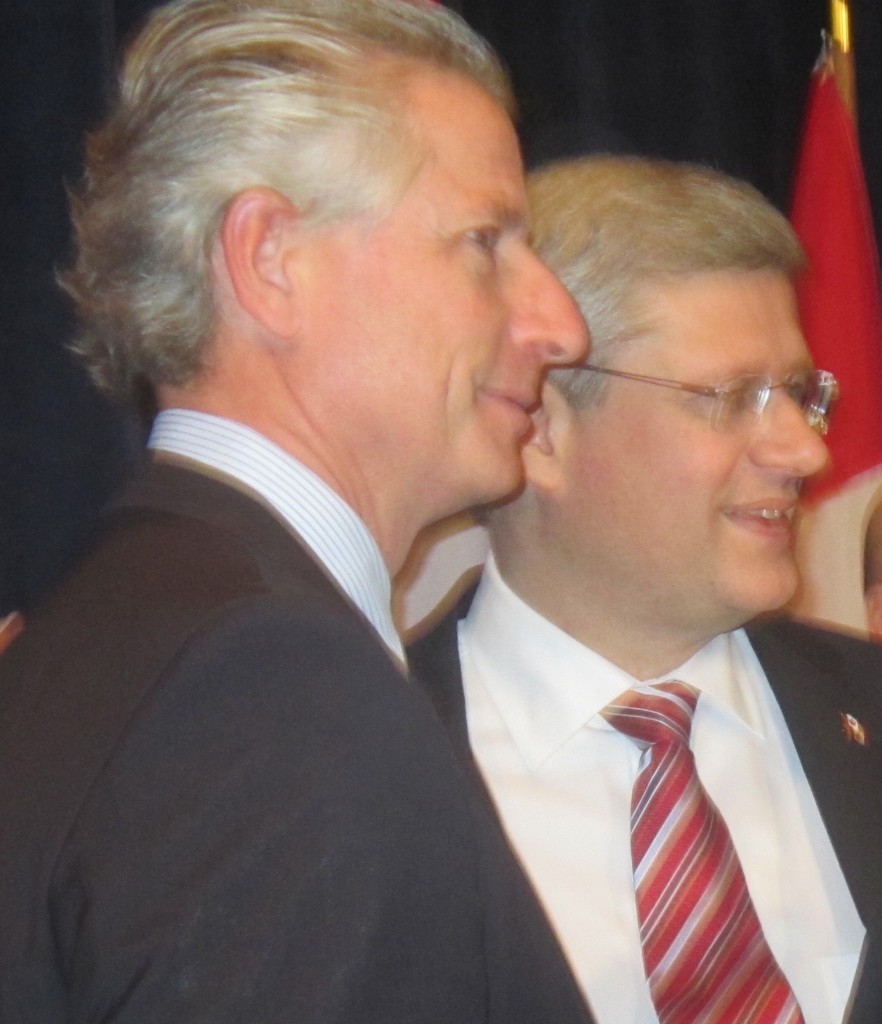 Joseph Brant Memorial Hosapital CEO Eric Vandewall poses with Prime Minister Stephen Harper - the PM didn't have a cheque for the CEO. Vandewall wants to get his picture taken with the Premier of the province - that's where the funds have got to come from. If the figure reported is correct Vandewall is one of the best paid civil servants in Burlington. Well someone has to be at the top of the list and if the money that person gets is from the public trough – it gets declared. The presidents of large publicly traded companies have their salaries and benefits published in annual reports. The only time you don’t have to tell the world what you’ve earned is when it is a private company that you own. Then the only person you have to tell is the tax man.
What is frustrating is the tendency some civil servants have to duck the very valid question: How much public money are we giving you? Then the public can decide if the person is worth what they are being paid.
Andrea Horwath, NDP leader and MPP for Hamilton Centre makes the point that “leadership on cost-cutting has to start at the top. You can’t expect a nurse to take a pay freeze while the CEOs are raking in not only high salaries and bonuses but also perks … These perks are all part of the equation, when we look at trying to get control over costs in the hospital sector” says Horwath.
Horwath has long been fighting to rein in hospital CEOs salaries and in the process scores political points and keep her blue colour base happy.
Smith makes nearly $725,000 a year and Martin is just over $700,000. Higgins makes nearly $490,000 and Vandewall gets just over $350,000 in salary and taxable benefits.
At St. Joseph’s Healthcare, CEO Kevin Smith gets $1,000 a month and drives a Mercedes ML Diesel SUV. Smith is paid nearly $725,000 a year. Heck based on that – Vandewall (who gets just over $350,000) should be looking for an increase. Because for the next five years – maybe ten, he is going to be battling the bureaucrats at Queen`s Park to get the funding to rebuild the Joseph Brant Memorial Hospital, when the province doesn`t have any money and at the same time deal with city hall to coax out of them some of the cash they already have in the bank.
Vandewall has to clear the property parking lot so that the expansion can take place and to do that he has to build a parking lot. The city of Burlington doesn`t want to put their money into a parking lot for a couple of reasons: there is nothing sexy about a parking lot and the city isn`t all that sure the province will really, really come through. The Mayors Letter to the Editor in the Post notwithstanding. To hand over $20 million to the hospital now and see a parking lot go up – and not get the revenue from that parking – is proving to be a tough one for the city to swallow. The definitive agreement between the city and the hospital is still going back and forth. But somehow Vandewall has to convince the city to let the money flow his way.
 Vandewall has to attend every Gala that is put on to raise money for the hospital - but he doesn't have to pay for the tickets. Then he has to glad hand for the next five years to get the people with deep pockets to come up with the $60 million the Hospital Foundation has to raise. Were I Eric Vandewall, I would be renting billboards and telling the city how much I am being paid and then ask for a raise. He has one of the toughest jobs in the city and quite frankly I don`t care what kind of a car he drives. That is none of my business. How much we give him to pay for the car – that is public information.
When on compares what Vandewall is earning with what his colleagues a few miles away are earning and you measure that against what the guy does – he is worth every dollar we are giving him. This guy oversees the building of hospitals – and that is no simple task.
Before coming to Burlington, Vandewall was the senior vice-president of Trillium Health Centre, where he over saw the building of the Trillium Health Centre’s West Toronto 18,510-square-foot addition and 23,575-square-foot renovation.
Construction setbacks – including a labour strike, record summer rainfall and construction challenges – put the project behind schedule. Still, Ellis Don, the general contractor, was able to make up the time to bring it in on time and within budget, which included being just under the five per cent contingency allowance.
While Vandewall didn’t do all this by himself he certainly directed the team and made all the parts come together. This guy knows how to get a hospital built – now if he can learn how to work a little more effectively with the city and soothe the nerves of the politicians who will take it in the neck if they end up paying for a parking lot garage and then have to wait more than ten years for their hospital.
One thing that did surprise me about the pay packages was that the cost of subscriptions to the numerous galas these people have to attend is covered in their remuneration package. What we are doing is using tax dollars to pay these administrators – some of whom are brilliant – and then giving them a perk that they use to buy a ticket to a fund raising event to build the hospital. Is that what they mean by paying Peter to rob Paul? I thought these people paid for their tickets out of their own personal funds. Maybe I am naïve.

 By Pepper Parr By Pepper Parr
BURLINGTON, ON December 28, 2011 – In the world of politics it is called getting ahead of the parade. When there is some news you know is going to create some controversy, you get out in front of it and do your best to control it, put it in context and frame it with as much positive data as you can. Smart people do that –they work at creating the agenda rather than being the agenda.
Come Tuesday of next week, Eric Vandewall and others at the Joseph Brant Memorial Hospital (JBMH) will be the agenda when what they are paid each year is made public. The province decided some time ago that what hospital administrators are paid is public information and can be learned through a simple access to information request.
Several local media then gave the JBMH a call a few days before Christmas and asked – “well just how much are you paying the lad?” and were told that the media would have to wait until January 3rd, which is what the rules call for. All the hospitals in the Burlington-Hamilton area got together and agreed that they would all release the numbers at the same time. In the commercial world that’s called collusion and if they were selling something we would call it price fixing, but I digress.
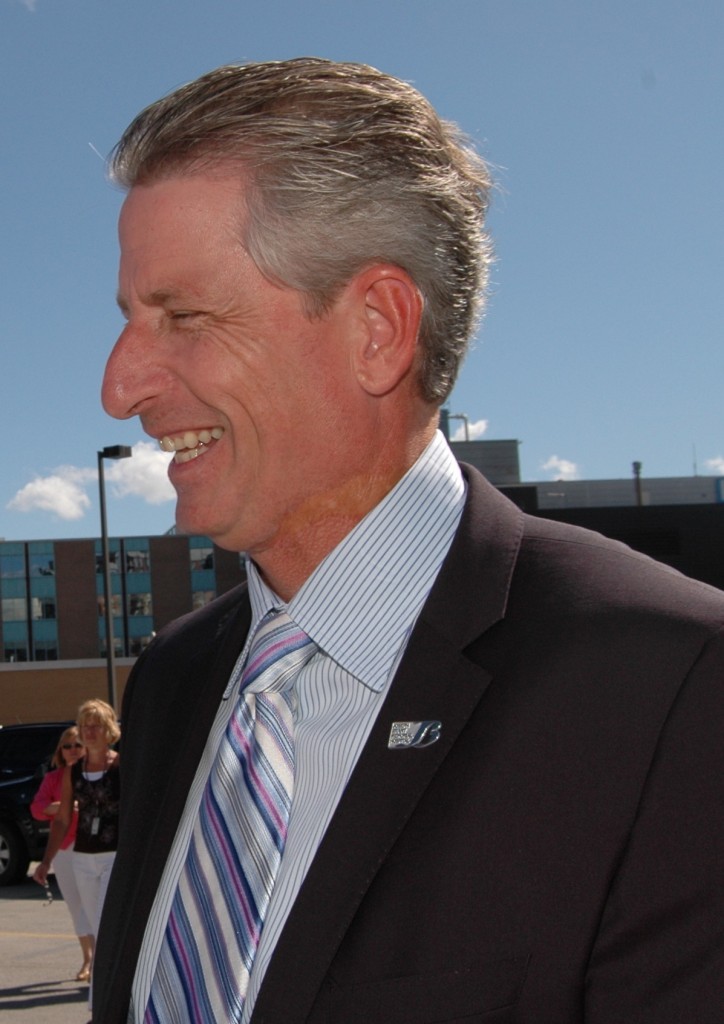 Joseph Brant Memorial Hospital CEO Eric Vandewall is about to tell us what he gets paid annually. He didn't volunteer this information. Hospital administrators are paid with tax dollars and Ontario has for some time made the salaries of those paid by the taxpayers public information. It has been called the Sunshine list and is released each year.
The public relations people at JBMH had an excellent opportunity to be seen as complying openly and willingly with the new rule – but instead of doing that they decided to drag their feet and leave the impression that they really don’t want you to know – and come Monday they will be the news story of the day unless there is a natural disaster somewhere in the world.
I have always wondered why intelligent, highly paid people do such stupid things. It’s kind of scary when you think about it. They don’t seem to be able to think much beyond the end of their noses or they are far too focused on their own self-interests – either way – scary.
These are the people we pay very well to make good decisions on our behalf and when they behave like this – stalling for what amount to less than two weeks one wonders – why?
A positive news story would state what Vandewall is paid and then put it in context with say what the city manager is paid ($214,000+ for the last one) and what the President of McMaster University is paid and then look for what some of the publicly traded companies are paying their CEO’s. Help the public see and appreciate the value we taxpayers are getting for the dollars that go into their pockets.
The medical community has always had a rather high level of arrogance about it. One had to just watch Vandewall when he last appeared before city council. He wanted money the city had set aside as its share for the re-build of the hospital and the sooner the better was the message he was sending. Vandewall told council that the hospital Foundation would match what the city was putting up, $60 million of your dollars over a six year period. Add the city’s $60 million to what the hospital Foundation was committed to raising and you have a handy $120 million.
 Hospital Foundation Board - needs to raise $60 million. So far has only managed to get their picture taken. Nice picture though. Problem is the Foundation has yet to raise a dime, at least they haven’t reported any funds being raised but they did have a nice picture taken of themselves. In due course the Foundation will raise its share but right now the hospital needs to lay its hands on some cash so the early prep work for the eventual re-build of the hospital can get done.
One of the first layers of that work is the building of a parking garage. Why a parking garage first? The hospital has to clear some land that will be used to add the new extensions to the hospital and they need a place to put the cars currently parked on the hospital lot. So, they thought, why not get the city of Burlington to pass along some of the money needed to build the garage.
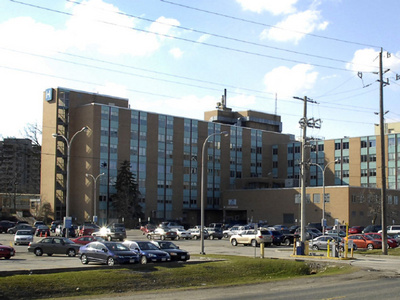 Parking space - someone has to come up with the money to pay for a parking garage so that these cars have a place to go. Burlington city council isn't very keen on city money being used to pay for a hospital parking lot. Not so fast, say the folks at city hall. Before as much as a dime of city money goes to the hospital, the Memorandum of Understanding (or whatever they are going to call the document that sets out who gets what and who does what) has to be signed. That document has been in the negotiation/development stage for more than four months now. Ward 3 Councillor John Taylor is keeping a very close eye on this one – he’s not about to see a big chunk of the city’s money get used to pay for a hospital parking garage. Taylor was heard to mutter something about maybe having the parking lot revenue go to the city.
All the Senior people at City Hall get their names published in the Annual Sunshine list (Its officially known as the Public Sector Salary Disclosure Act), if they earn more than $100,000. The list comes out early in August – we’ll see that you get a copy. Eric Vandewall earns well in excess of $100,000; he may well be the best paid civil servant in the city, an accolade he isn’t going to want to wear on his lapel.
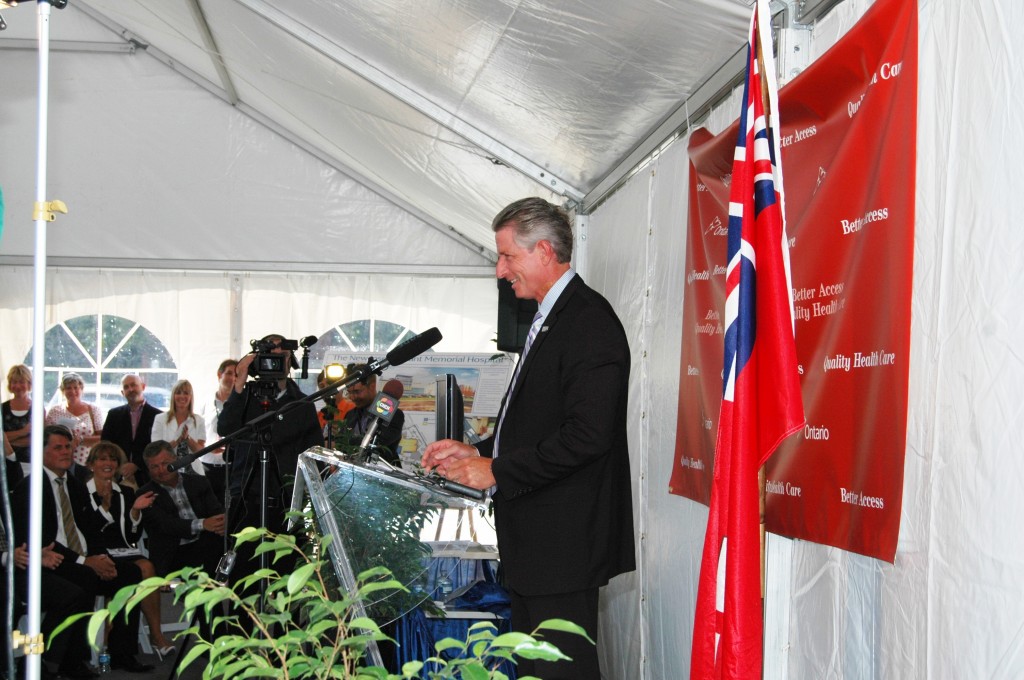 Hospital CEO Eric Vandewall stalling for time while waiting for a provincial government Minister to show up to announce that the hospital re-build would be funded. The Minister never arrived. This isn't the last time the provincial government is going to let the CEO down. Good talent has to be paid the going rate and there are not a lot of exceptional hospital administrators in the province. Vandewall was brought in to clean up a real mess and it would appear that he is doing a very good job at what he is being paid a very good salary to do. The public needs to appreciate that his job is to get the new hospital Burlington has wanted for some time built – and the faster the better.
Part of the problem is that the kind of hospital Vandewall is beavering away to get built down on Lakeshore Road may not be the kind of hospital Burlington needs for its aging population. There is reason to believe that Burlington might be much better served with a community type hospital and have Hamilton and Oakville handle the type of medical situations that calls for the high tech/emergency level care.
It is becoming increasingly clear that the needs of our aging population are probably not best met with the type of hospital JBMH is slated to be rebuilt into. What is best for the city is not yet clear but no one seems to want to ask the question: What kind of hospital is going to meet the needs of our changing demographic and at the same time meet the needs of the current growing population. But there isn’t a politician in this city who is going to stand up and ask that question publicly. It would be really interesting to hear what people within the Ministry of Health and Long Term Care think is best for Burlington long term.
He has to do this job and get it done while working with a government that seldom tells him the truth and happens to be broke and isn’t likely to come through with the money needed to do the rebuild. Eric Vandewall has a very tough five years in front of him. He isn’t going to be able to do what he was hired to do – through no fault of his own.
So he looks at the pile of cash Burlington is sitting on and looks for ways to get it out of the city’s bank account and into the hospital’s. Good luck Mr. Vandewall. There happens to be a wily old coot sitting at that Council table and he isn’t at all keen on seeing city money used to pay for the building of a parking garage. Part of the garage ? – probably.
When they all learn what you’re being paid – they are going to make you work very hard for every dollar of it.

 By Pepper Parr By Pepper Parr
BURLINGTON, ON December 16, 2011 – The good folks at Burlington’s Joseph Brant Memorial Hospital tells us that the province is in for the money needed to do a major upgrade to the place – which is badly needed. The hospital board reports that they have a memo from the provincial government – AND that the hospital’s name is on an infrastructure list of communities that are going to get funding.
With good news apparently on the way the hospital goes out and rents a nice big white tent and everyone who is anybody in town shows up for THE announcement.
But the Minister, doesn’t show up. We are told her car got stuck in traffic. A substitute Minister is on hand to give, what is at best an embarrassing situation, the spin it needs. Ted McMeekin talks about the great care he got at the hospital when he needed help. Fair enough.
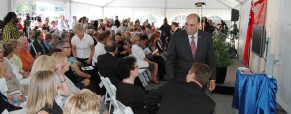 Burlington's best wait on a sunny afternoon for a provincial government Minister to arrive with a "good news" announcement - She fails to show - an ominous sign for the city. The Minister that didn’t make it to the meeting lost her seat in the election and the guy that told us about the great care he got makes it back into Cabinet. Such are the vagaries of provincial politics.
That the province was in the middle of a provincial election and the Liberals thinking they just might be able to win Burlington this time out, throw everything they have into the Burlington campaign. Almost daily press conferences, photo ops, a visit to the city by the Premier – all for not. The solid Liberal candidate got beaten soundly by the Progressive Conservative candidate who had no political experience nor was she active in the community before she was elected. The riding hasn’t gone Liberal since the early 40’s.
 Then Liberal candidate and former hospital board member Karmel Sakran chats with Joseph Brant Memorial Hospital CEO Eric Vandewall the day a provincial government Minister failed to show up for a "good news" announcement. The Liberal candidate, who was at one point the vice chair of the hospital board swears that this is going to happen – the hospital is going to be funded. The only thing we didn’t hear was someone swearing on a stack of bibles that it would happen.
City Council has been told they will have to come up with a significant chunk of the millions it is going to cost to refurbish the hospital and they put in motion the steps needed to impose a tax levy. The city manages to put $20 million plus into a reserve fund.
 Hospital Foundation Board gets picture taken as they gear up to raise $60 million from within the community. The hospital is grateful and tells the city they are going to match – dollar for dollar – what the city contributes. Combined the community is committed to come up with $120 million. It must be noted however that while the city has $20 million plus in a reserve fund collecting interest the hospital,s foundation hasn’t announced a dime of fund raising. They did release a nice picture of themselves though.
Then the hospital asks if the city might send along some of those dollars to build a parking garage that is needed. A PARKING GARAGE the citizens ask – we wanted a hospital.
Hospital spin doctors explain that a parking garage has to be built so that there is a place for the cars to be put so that the land the cars are now parking on can be dug up and used for the magnificent expansion that is going to come. We know the hospital is going to be refurbished because the province promised us that. Yeah right. Oh, and there is a pretty picture to show what the new building will look like. It gets better.
 If it ever gets built - this is what the architects expect it to look like. Don't think there will be any big bets placed on this happening by the announced date. The city and the hospital start talking about an agreement as to when and how and under what circumstances the money Burlington city has raised will be passed along to the hospital. This is one of those occasions when the city’s legal department is being closed mouth and rightly so.
There are many, including Councillor Paul Sharman who feel the city could get “screwed” by the province and he doesn’t for a second trust them. He wants an agreement with the province “in our back pocket” – then money can flow. Sharman points out that the province has both a budget shortfall and some very significant debt that is going to have to be paid down and he doesn’t believe the province is going to have any money for an upgrade to the Joseph Brant Memorial Hospital.
Councillor Marianne Meed Ward believes the province will come through with the money. Meed Ward sat on the hospital board as a citizen before she was elected to council and has in the past worked as a communications advisor to the hospital during the very tough Cdifficile days when more than 80 people lost their lives.
The day after Sharman said he wanted to see an agreement between the city and the province in place before he would go along with the money the city now has in the bank going to the hospital – guess what? The financial press reports that an influential credit rating agency, Moody’s Investors Service had turned “negative” on the province. They warned that they might have to lower the province’s credit rating if it “doesn’t take serious steps in the next budget to deal with the multi-million dollar deficit.” Hey isn’t that the budget that has the money for our hospital refurbishment in it?
The province has a $16 billion deficit and an economy that is on the sluggish side which means it is going to take longer than expected to reduce that deficit.
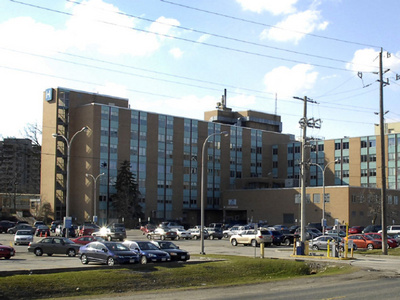 Joseph Brant Memorial Hospital is a little like the provinces economy: a little the worse for wear and tear and in need of a fix up. Problem is the economy has to get much better before the hospital refurbishment can go forward, The problems with the American economy are holding Ontario’s economy back and the problems in Europe, which almost defy understanding, aren’t helping either. With a credit rating change apparently in the works – unless the budget shows some serious intention at restraint – it will be more expensive to borrow. And, if the financial press is to be believed, foolish to do so as well.
So now that the ducks are all lined up – what do you think is going to happen? Grab your ankles and hold on tight. This is going to hurt.
All however is not lost. There is an opportunity for this city to do something really different; something that meets the real needs of the city and not the desires of the medical community. Mayor Rick Goldring recently invited a highly regarded expert on public health policy, Andre Picard, who suggested that smaller community hospitals were the best tool to meet the medical needs of the aging population Burlington has to deal with.
For some reason – both your city council and the people who run the medical services in this city want a big expensive hospital that the province can’t afford. We seem to be stuck on a building we perhaps don’t need. Hamilton has all the medical capacity we need and Oakville is getting a really large medical complex. I’ll take the ambulance ride to Hamilton or Oakville if you don’t mind.

 By Pepper Parr By Pepper Parr
BURLINGTON, ON November 26, 2011 – Burlington`s Strategic plan calls for the city to set aside $10 million a year for the next six years to pay for a part of the upgrading of the Joseph Brant Memorial Hospital which the province has promised would take place in 2013. The Mayor`s Inspire series speaker last week seemed to suggest that an upgraded hospital was not what Burlington needed.
Globe and Mail health columnist Andre Picard, an eminent policy analyst in the health field and the recipient of numerous awards including the Michener Award for Meritorious Public Service Journalism, the Canadian Policy Research Award, the Atkinson fellowship for public policy research and the Centennial Prize of the Pan American Organization. He was named Canada’s first Public Health Hero by the Canadian Public Health Association and was honoured as a champion of mental health. He is a four-time finalist for the National Newspaper Awards. In other words he is thought of as someone who knows what he is talking about. So when he suggests that upgrading of the Joseph Brant Memorial Hospital was not necessarily the best thing to do with the limited resources available we might want to sit up and listen.
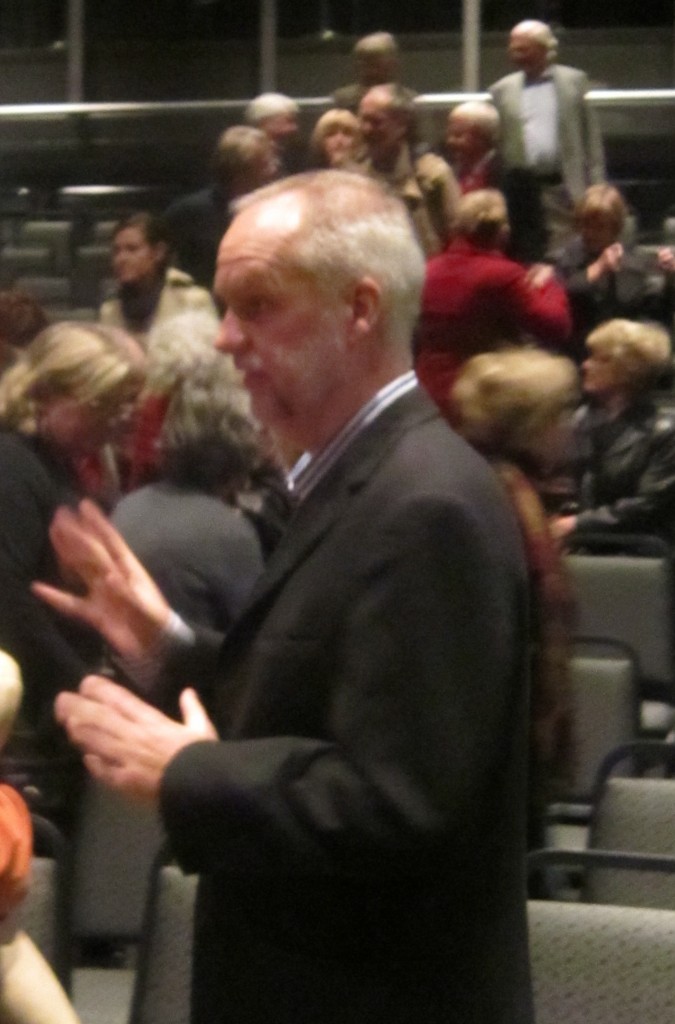 Andre Picard, a noted authority on heath services policy and lead columnist for the Globe & Mail was just a little cool to the idea of a new hospital for Burlington at the Mayor's Inspire series last week. Picard outlined the need for community delivered health services which led to Our Burlington asking Mr. Picard this question: If you are calling for a community based system to deliver health service because that is more cost effective delivery and better health – then does Burlington need a major upgrade to the Joseph Brant Memorial hospital ?
Picard equivocated a bit with his answer when he said it would depend on there being hospitals close at hand that could deliver the kind of service that only a hospital can provide and then added that he thought an upgraded hospital in Burlington was probably a good thing, more or less. More or less? That wasn’t exactly a ringing endorsement was it?
Using his criteria – one could argue (and the provincial government might well do that) that there are excellent hospitals in Hamilton and Oakville which are a very short ambulance drive away. You can get to a Hamilton hospital from Lowville faster than you can get to JBMH.
Does Burlington then need an upgrade to its hospital? Asking that question in this city and you have really put the fat in the fire. All three candidates in the recent provincial election swore on their Mother’s graves that they would fight mightily to have the province give a firm commitment – with a date attached to it – guaranteeing that our hospital would get the upgrade it needs and which we were promised.
And now we hear from one of the best thinkers in the country suggesting that a new hospital in Burlington might not be what’s best for the community. Isn’t that ducky?
We know the province doesn’t have any money, and we know that our economy is getting more wobbly every week. But no one at the provincial level is suggesting that Burlington might want to look at a different model to meet the needs of its aging population.
The city did, what it thought was best, and what the province required them to do, and that was put up $10 million a year for six years to pay for a portion of the cost of the upgrade, we have been told was totally necessary.
The city and the hospital are still working out how the $60 million the city is going to put into the kitty will be spent. At this point it looks like the city’s money will be used to pay for the building of a parking lot, because the space now being used to park cars is needed for the expansion that is planned. The city hasn’t written the cheque yet – maybe they want to put a hold on it and ask the hospital to sit with them and take another look at the plans.
 Andre Picard, speaker at the Mayor's Inspire series has given Mayor Goldring much to think about, when he came out as less than enthusiastic about the planned JBMH upgrade. That will take a level of political courage that is seldom seen.
The long term outlook for a new hospital in Burlington just might need a real hard look before we do something really dumb. Added to Picard’s Wednesday evening comments, were remarks made in the provincial Legislature on Thursday, where an NDP member read out the list of hospital upgrades the province is talking about – more than 20 of them. In the economy we are in it just can`t happen. And someone needs to begin to be much more honest with the people who live here, pay the taxes and expect the public health services they need
Every candidate in the last provincial election said they would ensure that we got the hospital upgrade – what wasn’t asked was – do we need a hospital upgrade? Every candidate said, what they thought you wanted to hear. Not one of them had done their homework. One of them, Liberal candidate Karmel Sakran, used to sit on the hospital board and was as close to the center of political power as one can get – and he never suggested, that perhaps the hospital model we are working within is the wrong model.
All the candidates just mouthed, what they thought the voters wanted to hear. Should the province decide that Burlington is not the place for a large expensive hospital, and that we should have a number of community care centres spread throughout the city – – just wait for the political howling.
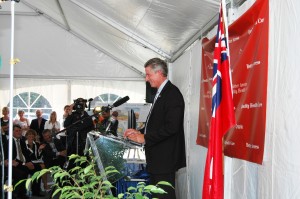 JBMH president Eric Vandewall might want to have lunch with Inspire speaker and noted authority on public health service delivery and talk about the best form of public insitution to meet the needs of the community. Mayor Goldring might want to sit in on that lunch - even pick up the tab if some sensible thinking comes out of the meal. Picard`s comments suggest that Burlington might not have made the smartest move. Is the city – that means both the citizens, its city council and the senior hospital staff plus the Board of Directors – courageous enough to ask the hard questions like, is this really the best thing for the city and its citizens?
One would hope that the Mayor would take the opportunity to have dinner with Picard and ask some hard-nosed questions. Maybe even ask for some advice as well on how we determine what is best for the city. In the meantime, don’t write the cheque that would deliver the $20 million plus sitting in the bank.
Let’s be absolutely sure we are doing what is best for the community and not just what’s best for the medical community who would love to have a shiny new building.

 By Pepper Parr By Pepper Parr
BURLINGTON, ON November 26, 2011 – It was both a lecture on the health service delivery system we have and another look at what the Mayor does as he develops ideas and consensus in the minds of the citizens of Burlington. The event, the Mayor`s Inspire series of lectures, used to be held at the McMaster DeGroote school of business on the South Service Road but got moved to the Community Studio Theatre in the Burlington Performing Arts Centre when that space became available. It may be moving again because this last session was basically a sold out event.
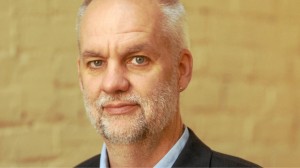 Speaker at the Mayor's Inspire series Andre Picard outlined the way health is delivered and how that delivery could be improved. Andre Picard, Health reporter for the Globe & Mail came to talk about health care and started with a 20 minute overview of how the government got into the public health business and where we are today – and in the process dispelled a lot of myths. The one that really grabbed me was the fact, according to Picard (and he tends to know the numbers side of the health business) that the government spends on average $15. a day to provide health services for Canadians. That`s all it costs ? – fifteen bucks a day ?. As Picard put it – “you spend that much a day on those latte coffees”.
The audience was taken through a historical tour – the first medicine was delivered by the Ursaline nuns in Quebec. Jeanne Mance opened the first hospital in Montreal and right up to the first world war it was charities for the most part that provided public health. The 1918 Spanish flu that took 60 million lives brought about the need for government to get into the business of providing health services for the public.
The outbreak of polio after the second world war and the prevalence of tuberculosis brought the government into the health business. It started in Saskatchewan where Tommy Douglas said a family should not have to lose the farm to pay the medical bills.
And today we have 15 jurisdictions managing health care that is supposed to be delivered under five prime principles set out in the Canada Health Act. Few remember what those five principles were and few of the five are actually met. Portability was one – the medical health we have really isn’t portable from province to province, but if you are sick in your own province you will probably get the care you need. Sometimes you have to fight for it and it often fails the public it is supposed to serve – but it is what we have.
 The hospitals we have today, argued health writer Andre Picard meet few of the needs that an aging population faces.. He advocated for community level service delivery. 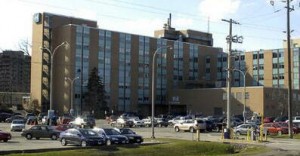 The JBMH, due for a major upgrade in 2013. The city has $20 million of its portion of the cost in the bank. Is the upgrade really the best thing for the city' Picard argues that the hospital of the 21st century is a very complex building and are very expensive to operate. We keep people in these hospitals at a close to exorbitant cost, he said, when there are much less expensive places to put people where better medical service can be delivered.
Our hospitals, according to Picard cannot be everything to everyone. We have to have the right people in the right places and a hospital for someone who should be in a setting where they can get the service and support they need – that is the direction we are going to have to go in.
Picard told his audience that he didn`t think there was a lot of fat in the way hospitals are run but that he didn’t think there was much in the way of efficiencies either and that there was way too much bureaucracy.
The doctors, commented Picard, are doing very, very well under the fee for service system the government put in place, but it isn’t a very efficient way to spend the health care dollars, and as Picard put it “they have their sticky little fingers in everyone else’s pie”. There are many things doctors are doing that could be done much more cost effectively by well-trained nursing staff, but the fee for services model we use has doctors doing as much as they can – that’s how they get paid.
Picard told his audience that Canada has 5,000 more doctors now than it had three years ago and that “we just cannot keep growing the medical community at this rate. We are not using technology the way we should; many hospitals are still using paper records, which contributes to the 24,000 people who die each year as the result of medical errors. Technology, properly used, takes pressure off workers. The technology is not going to save us any money, however it will mean better patient care.”
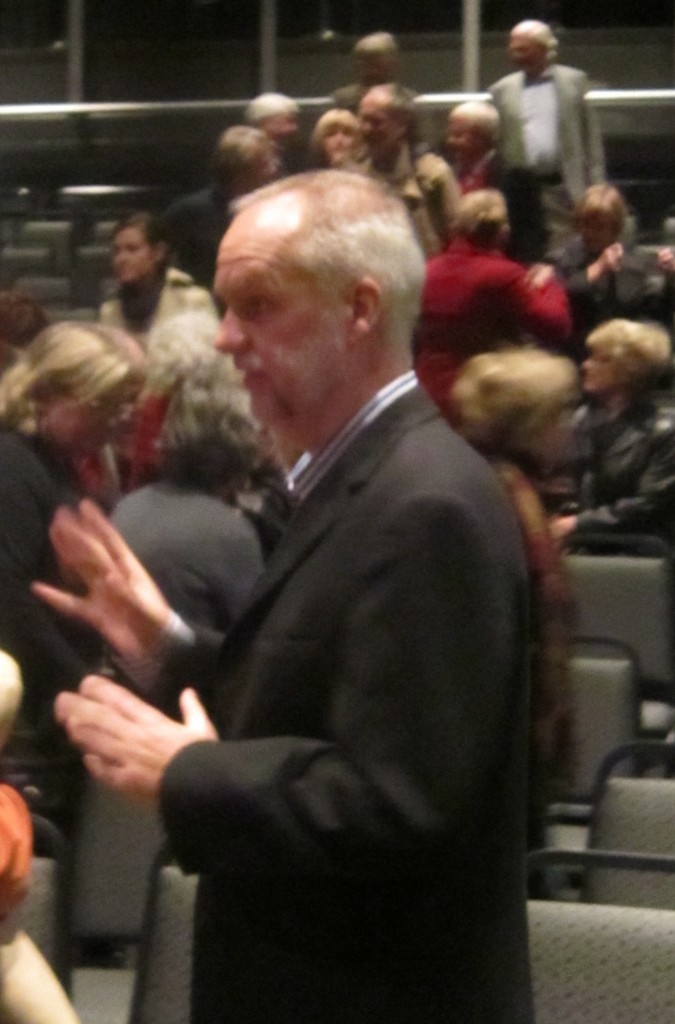 Andre Picard, noted health policy writer engages a guest at the Mayor's Inspire Series at the Burlington Performing Arts Centre. Picard wanted to see the phrase “customer service” used in hospitals. “When” he asked, “was the last time you heard someone in a hospital ask: ‘Can I help you’ and when did you last see someone in a hospital look you in the eye”?
Picard told the 200 people in the room that the public/private health care debate is a phone debate. There are some health services that are best delivered by the private sector and paid for by the government. He explained that heath service is legislated in Canada and pointed to the Canada Health Act which sets out what the government will do and will not do, whereas in Europe the governments tend to regulate instead and their workforce is more efficient.
Our hospitals have in some cases become holding pens for elderly people, when they should be in their homes where they are more comfortable and can still get the care they need. Hospitals are the last resort and for the most part they are not safe places, Picard added.
The average age of Canadians in 1965 was 25 – now the average age is 47 and that number will climb for a few more years. In an earlier time hospitals provided acute care, patients when into a hospital to get treatment and were either healed or they died. With an aging population many need care for chronic conditions and that is not best delivered in hospitals. Many people have multiple disabilities in their declining years, but don’t need care in the kinds of hospitals we have today. The system we have is not built to deliver chronic care – community based service can deliver that kind of care.
There is no entry point into the medical system in this country according to Picard. If you have a problem far too many people head for emergency, because that is the only way they can get in. And once they get in – they end up staying in because there is no way out.
Picard believes that with a community based system there would be a team of people waiting to serve the needs of a patient and would handle everything from welfare through to home care for people that have those multiple chronic ailments. And most important to this team/community based approach would be a person known as the “navigator” who would ensure that patients got moved from level to level. If treatment in a hospital was necessary the ‘navigator’ would work with the team to ensure that happened. Better co-ordination is the future said Picard and more empowerment for staff, and equally important, accountability. “When they don’t do it well – remove them”, advised Picard. Picard made no mention of how removing staff would get done in the union environment we have.
The LINCs are, in Picard’s opinion, poor substitutes for the Regional approach that should be taken to providing medical care. The country, he said, needs a sound debate on what the public wants and what government can afford. “The goal of a healthy medical system” he said “is spending the money available wisely, delivering care so that we have a healthier population that can live a good life and have a good death”. It was clear from what Picard had to say that he doesn’t think we are there yet.
During the question and answer session Picard perhaps surprised many when he said he didn’t think Prime Minister Harper wants to have anything to do with health care and that Ottawa really isn’t that big a player in the game. They are responsible for aboriginal health care where everything – dental, optical – is included. The natives have the best health care in the country – why can`t the rest of us have that kind of care? Picard added that he personally didn’t think Harper wants to make his mark in health care..
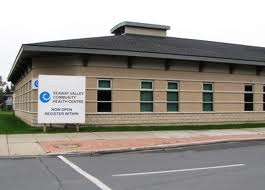 A community health centre in Cornwall, Ontario got started this way: “It’s about taking care of our day-to-day health needs, as well as promoting a healthier, stronger and more sustainable community,” said Debbie St John-de Wit, the Centre’s Executive Director. It’s been almost a decade since the notion of a new community health centre for Cornwall was first conceptualized. Incorporated in February 2005, a dedicated and passionate community-governed, volunteer Board of Directors began evaluating the community’s health needs in order to develop a customized primary health care delivery model. The planning process involved several community engagement sessions and meetings. In 2007, the Board of Directors received approval from the Ministry of Health to proceed with the feasibility study, and in 2009 the Ministry approved for the construction of a new centre. Picard closed his presentation saying that home care is safer, cheaper and people like it. The trick he seemed to say was the administration and delivery of health services into units that have populations of about a million people and allocate the funds to those groups and let them figure out what`s best for the community.
Picard made one very trenchant point, when he said the Canadian Medical Association speaks for the medical community. There are, said Picard “body part” interest groups. Every imaginable group is represented –heart, kidney, lungs, but have you noticed he asked “that the public isn’t represented”. There isn’t a Canadian Patient Association.
The medical business he said, needs some democratization – it isn’t a fair fight the way it`s set up now.
The reality he added is that there has to be some “private” in the health care field and Critical Illness Insurance was something that made sense. More than 22 million Canadians have some form of private medical care.
Our care patient service has to be delivered where the patients are – it could be delivered in a mall location if that worked.
Someone asked Picard what he would do if he were the Minister of Health and he responded instantly with – “well the first thing I would do is get rid of the Ministry and run the place with my cell phone from the car they would drive me around in”. “I would then transfer funds from the Ministry to the different regions that would be set up to deliver health services to communities across the country with no one grouping having much more than one million people within it”. One got the impression that Picard wouldn`t be building a lot of hospitals either.
As for Burlington and the Joseph Brant Memorial Hospital – Picard equivocated when asked if upgrading the hospital was the right thing to do. “More or less”, he said. For a guy who had very strong, direct statements to make on just about everything else he said – ‘more or less’ – was rather telling.
In bringing Andre Picard to Burlington to talk about the delivery of health care Mayor Goldring may have brought to the surface the need for all of us to take another really close look at how we make decisions. Is an upgrade to the JBMH the best thing for Burlington? Good on you Mayor Goldring for bringing Picard to Burlington – even if his comments will make your life a little bit more difficult – you did the right thing.

 By Staff By Staff
BURLINGTON, ON November 12, 2011
Going out on a high note is the best way to leave the stage – which is what Mayor Goldring is doing with his Inspire series when, Andre Picard, Health reporter and columnist for the Globe and Mail will be the featured speaker at the last of the 2011 series the Mayor instituted during his first year in office.
Attendance has been good and it will grow as people get used the idea of speakers coming to Burlington with new ideas that stimulate and offer new and different perspectives and begin to recognize the quality of the speakers the Mayor is bringing to the city.
The series started with Christopher Hume, Architectural reporter and columnist for the Toronto Star who told his audience that McMaster University`s behavior in the way they handled building of their Burlington campus on the South Service Rd., was a moral outrage. There was no doubt in his mind where he stood on all this.
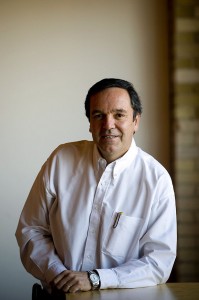 Gil Penalosa was the second featured speaker in the Mayor's Inspired series. That was followed by Gil Penalosa, a passionate advocate for improving quality of life through the promotion of walking and bicycling, and of parks, trails and other public spaces as great places which foster vibrant cities with healthier communities and happier residents.
Penalosa earned a Master in Business Administration (MBA) from UCLA’s Management School. Following years of private and public sector senior managerial experience, the Mayor of Bogotá, Colombia (pop. 7 m), appointed him Commissioner of Parks, Sport and Recreation for the city.
Penalosa led his team to design and build over 200 parks, of which the best known is the Simón Bolívar (360 hectares). They were also successful in opening 91 kilometres of car-free city roads on Sundays, the Ciclovia, where over 1.3 m. people come out weekly to walk, run, skate and bike. They also created the Summer Festival, with over 100 events in 10 days and more than 3 million people attending and since the first year has become the main recreational event in the country.
 Tom Rand, author of Kick was the third speaker in the Inspire series. He advocated ways to reduce our carbon footprint. Penalosa was followed by Kick author Tom Rand, a successful software entrepreneur who survived the dot com bubble in 2000. Rand now focuses his efforts on carbon mitigation and is active in Cleantech venture capital, technology incubation and commercialization plus public advocacy. Rand is the Cleantech Practice, Lead Advisor at the MaRS Discovery District in Toronto and sits on the board of a number of clean energy companies and organizations, including Morgan Solar.
One speaker was on the platform the night of an NHL playoff game – but the crowd was still good – in the 150 + range.
The series have in the past been held at the Ron Joyce Centre of the McMaster DeGroote School of Business on the South Service Road. The Mayor has decided to keep the business in the family and this last event for the 2011 series will take place in the Community Theatre of the Burlington Performing Arts Centre. The event starts at 7 pm – the Mayor`s office likes to get a handle on possible attendance – the room holds just over 200 people.
Now – the speaker – Andre Picard.
Picard is the Globe and Mail’s public health reporter and columnist who was recently named the Conference Board of Canada’s CIBC scholar-in-residence.
The program has funded scholars since 2005, enabling them to carry out research on issues that resonate throughout Canada. Picard’s research topic is The Path to Health Care Reform: Policy and Politics.
“He’s the top health journalist in the country,” said Anne Golden, president and CEO of the Conference Board of Canada. “He’s able to cover both the policy issues and the politics because he’s been so engaged on the whole range of issues around all our health-care systems.”
The College of Family Physicians of Canada named Picard a recipient of its 2011 CFPC/Scotiabank Family Medicine Lectureship Award.
Mr. Picard has been recognized for years as one of the country’s top public policy writers. His books, Critical Care: Canadian Nurses Speak for Change and The Gift of Death: Confronting Canada’s Tainted-Blood Tragedy, were best-sellers.
Among Mr. Picard’s previous awards are the Michener Award for Meritorious Public Service Journalism, the Canadian Policy Research Award, the Atkinson fellowship for public policy research and the Centennial Prize of the Pan American Organization. He was named Canada’s first Public Health Hero by the Canadian Public Health Association and was honoured as a champion of mental health. He is a four-time finalist for the National Newspaper Awards.
Picard said being named the CIBC scholar-in-residence at the Conference Board will give him new opportunities and called it “a nice challenge.” “This one allows me to do some journalism – some long-form journalism,” he said. “It allows you to do the work that you usually do but in a different way and more in-depth.”
In a recent column Picard had this to say:
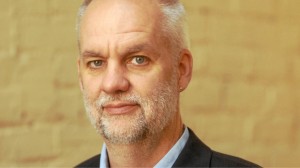 Andre Picard, Globe and Mail columnist and perhaps the most prominent speaker the Mayor has brought to Burlington. His views on our health system may include some comments on the Joseph Brant Memorial Hospital. He will be a very direct speaker. One of the fundamental structural problems in Canada’s health system is the lack of a clearly identified front door.
Put another way, there is no place where patients can routinely go to access the care they need promptly and efficiently and that tracks them throughout the health-care “journey.”
Traditionally, we have depended on family physicians to serve as that home base. Almost 30 million Canadians have a family doctor, but roughly four million others have none. Still, even for those with a regular caregiver, prompt appointments are hard to come by and same-day access – the gold standard – is a rarity.
So the de facto entry point into the system all too often becomes the emergency room (where patching and dispatching, and long waits, are the norm) or walk-in clinics (tremendous money-wasters that specialize in passing the buck back to ERs or family doctors).
Using these inappropriate points of access is the equivalent of entering your home by clambering up the fire escape or crawling in through a basement window, only to find that the door into the main floor is locked and you have to start over again.
It’s a terribly inefficient and expensive way to deliver health care. Among other things, when there is no front door, there is no real gatekeeper and, with the proliferation of ever-more-expensive drugs and technologies, the gatekeeper function has become more essential than ever.
Worse yet, regardless of what door patients use to enter the health system, there is little continuity in their care.
One of the principal reasons for this disjointedness is the lack of electronic health records. If someone has a heart attack and ends up in the ER, or is prescribed antibiotics at a walk-in clinic, or gets to see a specialist, his or her family doctor is unlikely to know.
This situation is not new.
 The Inspire Series is one of the best things the Mayor has done for the city. It ranks right up there with his decision to tough it out and continue with the building of The Pier. Primary health reform has been talked about for decades. In fact, with the publication of the Lalonde report, a ground-breaking document prepared by health minister Marc Lalonde in 1974, Canada became a world leader in the concept of primary care (but sadly not in the practice.) Every one of the dozens of health commissions since has dedicated a good chunk of its recommendations to the need for primary-care reform.
In the 2004 Health Accord, the provinces received $800-million to bolster primary care, but it was overshadowed by the politically motivated focus on reducing surgical wait times, where billions were invested to produce modest results.
The good news is that there has been a lot of progress of late on the notion that every Canadian should have a clearly identifiable primary-care provider for preventive care, sickness care, and some quarterbacking and follow-up when a patient needs acute care.
In the 21st century, this kind of care can’t be provided by a single physician à la Marcus Welby.
Today’s patients require episodic care occasionally, but mostly they need chronic care. Consider that 81 per cent of people over the age of 65 have at least one chronic health condition such as heart disease, diabetes, chronic obstructive pulmonary disease, etc. For the most part, they need a team to provide health care, not a single physician.
Thankfully, in recent years, there has been a significant shift to providing primary care using interdisciplinary teams. Alberta has Primary Care Networks; Ontario has Family Health Teams; Quebec has Family Medicine Groups and; most other provinces have variations on these names with similar philosophies.
We shouldn’t forget either that excellent primary care has been offered for decades by CLSCs (community health clinics) in Quebec and Community Health Centres in Ontario, but these pioneering initiatives have always been chronically underfunded.
But the process needs to be accelerated and valued. And, practically, that means shifting resources from acute-care hospitals to community-based primary-care practice.
 Picard is a prolific writer who works from his home in Montreal as the Globe and Mails Health columnist. He has been given some very significant awards for his work. The notion of creating a clear front door into the health system got a significant boost recently in a report from the College of Family Physicians of Canada, which represents the country’s 35,000 family doctors. (Canada has another 34,000 physicians in specialties other than family medicine.)
The CFPC calls for a model that has as its foundation a concept called the “Patient’s Medical Home.” The PMH is described as a family practice that serves as the “central hub for timely provision and co-ordination of a comprehensive menu of health and medical services patients need.”
The PMH is, naturally enough, centered around the family doctor (after all that’s who the CFPC represents), but, to its credit, the group fully embraces the need for interdisciplinary care, the belief that a patient requires a team or network of caregivers, including nurses, pharmacists, physician assistants, and other health professionals, located in the same physical site or linked virtually from different practice sites throughout the community.
The report also makes some key points that are not emphasized nearly enough in our continuing discussions about health-care reform. To wit:
The foundation of good healthcare is good relationships between providers and patients, and among providers;
Timely access to both prevention and treatment is an essential component of good health care, and Canada’s waits are among the worst in the world;
Patients themselves need to be active participants in their care. They need to take responsibility, not just be passive recipients of care;
Continuity of care has to be a priority because it is in the transitions – from the family doctor to the specialist, from the ER to the ward, from hospital to home, etc. – where all the bad things happen.
In Canada, we have a terribly knee-jerk reflex when responding to problems: We throw more money and bodies into doing more of the same, no matter how inefficient.
With primary care, the opportunity for reform lies in actually doing things differently and ensuring that patients have access to the right care, at the right time, from the right professional.
That can’t even begin to happen if there is no front door, no medical home for them to call their own.
Burlington is in for a treat. The Community Room at the Performing Arts Centre has seating for just over 200 people – this could be a SOLD OUT event, which by the way is free.

By Pepper Parr
 BURLINGTON, ON September 13, 2011 – They were all smiles – there was finally much more in the way of confidence on the part of Council – and now the city – that the expansion to the Joseph Brant Memorial Hospital is really, really going to happen. Hospital CEO Eric Vanderwall was there to tell Council that the hospital expansion would be complete in six years and open late in 2016 or early 2017. And oh, he almost asked, could we have the first payment on that $60 million you agreed to provide. BURLINGTON, ON September 13, 2011 – They were all smiles – there was finally much more in the way of confidence on the part of Council – and now the city – that the expansion to the Joseph Brant Memorial Hospital is really, really going to happen. Hospital CEO Eric Vanderwall was there to tell Council that the hospital expansion would be complete in six years and open late in 2016 or early 2017. And oh, he almost asked, could we have the first payment on that $60 million you agreed to provide.
When the hospital held a little mini gala sort of event early in August, with a tent outdoors and waiters walking through the crowd – and it was a crowd – serving hors d’oeuvres, we were all waiting for a Minister from the government to arrive and make it more official – and tell us that the hospital expansion was really going to be funded.
 Architects rendering of what the hospital will look like after the expansion has been completed. Plans are for an opening in late 2016 or early 2017 But the Minister didn’t make it – we were told that she got tied up in QEW traffic – poetic justice there for sure. Ted McMeekin, the man who lost his Cabinet seat to Sophia Aggelonitis, the Minister who didn’t make it to the meeting, handled the event and stretched it out as long as he could – and enjoyed every minute of his time holding the microphone.
But we finally all went home not exactly sure what had happened. Something was going on but no one in Burlington knew what the bureaucrats were up to. Well today we know – they were doing all the paper work and the background stuff; the scheduling and making the need for funds fit in with what the province will have in their piggy bank when it comes time to write cheques.
And the province won’t be writing cheques anytime soon. But Erik Vanderwall has a letter from the Minister of Health and Long-Term Care, Deb Matthews, saying that the province has us in the system and we are now part of the flow of funds out from them and in to us.
When Vanderwall was giving all this good news to your city council Mayor Goldring had the cheek to ask if he could perhaps see a copy of that letter. Eric, who really knows how to handle people, demurred and said while he had no problem with giving the Mayor a copy of the funding letter he didn’t think it was his place. Now the good Eric didn’t offer to ask the Minister if she would mind if he gave a copy to the city – nope, he suggested the Mayor contact the Minister and ask for a copy.
Golly gee – Burlington has been asked to put up $60 million of the “hundreds of millions” it is going to cost to do the expansion – you think the least they could do is get the city a copy of the letter that says the cheques will be in the mail.
Turns out that the money to pay for all the early stage work is going to come from Burlington. Vanderwall gave the city the schedule the hospital needs to get this project going.
Here is the schedule:
2011/12 $7.5 million
2012/13 $7.5 million
2013/14 $7.5 million
2014/15 $7.5 million
2015/16 $15 million
$2016/17 $15 million
for a total of $60 million which the city has committed itself to and already has a large chunk of the first payment in the bank.
The hospital wants that money pronto so they can get on with building a parking garage which will free up the land the expansion is going to be built on.
So Burlington is going to carry the can and pay the bills through to about 2014 (which is when this council is going to come to you to get re-elected).
 Hospital CEO Eric Vanderwall entertained the crowd for as long as he could last August but even he could only do so much. The Minister with the Announcement didn’t make it to the party so we all went home Vanderwall told council that the hospital will be completed in six years and that the Hospital Foundation has committed to meeting the city contribution of $60 million on a dollar for dollar basis. We were also advised that while nothing public could be said they had about $7 million already committed.
The hospital foundation has its Board of Directors in place. There is a Campaign Cabinet and an Ambassador Council in place to get the word out to the community and drum up those dollars. They have a lot of raffle tickets to sell.
Burlington has been sadly served by its hospital in the not too recent past. There were c.Difficile deaths that rattled the community and destroyed a lot of the confidence a public should have in its hospital. Eric Vanderwall deserves credit for re-building the level of medical service delivered by the hospital and spearheading the drive to get the funding needed from the province – which is why we pay him the big bucks.
But he could have gotten the Mayor a copy of that letter.
[retweet]

|
|
 The provincial government commissioned a document that came to be known as the Drummond Report. The purpose of the report was to tell the government where savings could be found and point to some possible directions for the government. One decision was to sell the LCBO warehouse on the waterfront in Toronto but it went much deeper than small cosmetic changes. The report made it very clear: there had to be very deep and significant cuts in spending which were set out in the 346 recommendations made in the 945 page two volume report.
The provincial government commissioned a document that came to be known as the Drummond Report. The purpose of the report was to tell the government where savings could be found and point to some possible directions for the government. One decision was to sell the LCBO warehouse on the waterfront in Toronto but it went much deeper than small cosmetic changes. The report made it very clear: there had to be very deep and significant cuts in spending which were set out in the 346 recommendations made in the 945 page two volume report.




























































